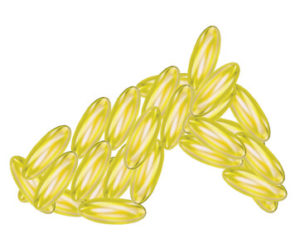When it comes to the equine diet there is a lot of information, especially conflicting information, about what should and shouldn’t be fed— the same is true of essential fatty acids for horses . And once a feeding regimen has been decided on, it’s time to consider the myriad supplements the horse needs. And how about fats? Many of us are familiar with the terms omega, unsaturated/saturated, and essential fatty acids, but what do those consist of? In the following, we break down why essential fatty acids are necessary, how they help and what to do to keep the equine body in balance.
Are Essential Fatty Acids Necessary?
The short answer is: Yes, fats are important to the equine diet. Many different fats are needed, such as saturated and unsaturated fats. Perhaps the most important of these fats for horse owners to be aware of is essential fatty acids (EFA). Unlike saturated fats, which horses can manufacture from excess carbohydrates, fat, and protein molecules, essential fatty acids (polyunsaturated and unsaturated fats) must be added to the diet since horses cannot synthesize them. Essential fatty acids are best known as Omega-3 and Omega-6 fatty acids, DHA, EPA and ALA. They are found in certain plants, as well as in cold-water fish. EFAs will help build the immune system to reduce laminitis and stomach ulceration; improve skin and hair condition; and serve as carriers for fat-soluble vitamins A, D, E, and K.
How Do EFAs Help?
The essential fatty acids produce hormones called prostaglandins, which enable necessary life functions. These hormones are in charge of many processes, such as tissue repair, growth regulation, central nervous system actions, inflammation control, and pain signal development. When the body is deficient in essential fatty acids, problems develop such as hair loss, skin problems, and impaired immune and reproductive function.
Keep Omega-3 and Omega-6 Naturally in Balance
Obviously these are important oils. And it seems easy, right? Give your horse these essential fatty acids and their body will do all the work. Well, not exactly. Certain oils are going to produce different kinds of prostaglandins that participate in each function, and an overabundance of one over another can be an issue. For example, too many Omega-6 oils can increase the rates of degenerative diseases and pain perception. However, we can’t just get rid of the Omega-6s, because they are in charge of developing those same signals of pain and inflammation. That’s where the Omega-3s come in and balance things out, as nature intended. For example, pasture grasses and freshly cut hay, although containing only 2% to 3% fat, are balanced in that they have greater concentrations of Omega-3 than Omega-6 fatty acids. By keeping that balance, we are allowing the horse to have optimum function.
Supplementing Essential Fatty Acids for Horses
There are many different ways to add these essential fatty acids into the diet with natural whole foods. Springtime offers many easy options that are nutritious, including Springtime Gamma and Springtime Spirulina Wafers. Springtime Gamma offers a nutrient-dense oil supplement that contains gamma oryzanol, a rice bran oil derivative. As a plant oil, it is high in unsaturated fats and essential fatty acids, and plant-based omegas are more readily absorbed by horses than fish-based omegas. Gamma, along with many other oils, allows less grain to be fed while offering the nutrition and fat horses need. It contains 2.5 times more energy than oats and is digested more efficiently in the horses’ small intestine. Springtime Spirulina Wafers may also be given to add in EFAs. Filled with antioxidants, amino acids, B-vitamins and more, Springtime Spirulina Wafers are a great source of GLA, Gamma-linolenic acid. GLA, a natural source of Omega-6, helps fight inflammation and combat allergies to give an overall healthy skin and coat. Spirulina Wafers can also nourish the endocrine systems and promote tissues.

